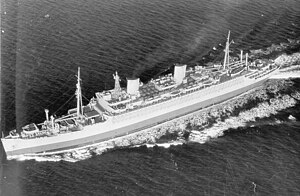USS Wakefield

USS Wakefield (AP-21) underway, date and location unknown
|
|
| History | |
|---|---|
| Name: | USS Wakefield (AP-21) |
| Namesake: | Birthplace of George Washington |
| Builder: | New York Shipbuilding |
| Laid down: | 6 December 1930 |
| Launched: | 5 December 1931 |
| Sponsored by: | Mrs Edith Kermit Roosevelt, widow of former President Theodore Roosevelt |
| Christened: | Manhattan |
| Acquired: | (by the Navy) 6 June 1941 |
| Commissioned: |
|
| Maiden voyage: | 10 August 1932 |
| Renamed: | USS Wakefield |
| Struck: | 1959 |
| Honors and awards: |
One battle star for World War II service |
| Fate: | Sold for scrap, 1965 |
| General characteristics | |
| Displacement: | 22,559 tons(lt) 33,560 t. (fl) |
| Length: | 705 ft (215 m) |
| Beam: | 86 ft (26 m) |
| Draft: | 30 ft 9 in (9.37 m) |
| Propulsion: | Steam turbine |
| Speed: | 21.5 knots (39.8 km/h) |
| Troops: | 6,000 |
| Complement: | 934 |
| Armament: | 4 x 5"/38 caliber guns, 4 x 3"/50 caliber guns; 8 x .50 cal machine guns |
USS Wakefield (AP-21) was a troop transport that served with the US Navy during World War II. Before her war service, she was the luxury ocean liner SS Manhattan.
Manhattan was built for the United States Lines (a subsidiary of J.P. Morgan's Roosevelt International Mercantile Marine Co.) at Camden, New Jersey by the New York Shipbuilding Company. She was launched on 5 December 1931, sponsored by Mrs. Edith Kermit Roosevelt, widow of former President Theodore Roosevelt.
After trials in and off the Delaware River, Manhattan departed New York City at midnight on 10 August 1932 for her maiden Atlantic crossing. Arriving at Hamburg 10 days later, she made the return voyage to New York in 5 days, 14 hours, and 28 minutes – a record for passenger liners. Proudly carrying the title of "the fastest cabin ship in the world", the liner continued to ply the North Atlantic from New York to Hamburg, via Cobh, Ireland, Southampton, England; and Le Havre, France, into the late 1930s. When Germany recalled her ships from the high seas during the Sudeten Crisis in September 1938, Manhattan was en route to Hamburg but immediately came about and put into British and French ports instead, to bring back anxious American travelers who feared that they would be engulfed in a European war.
...
Wikipedia
